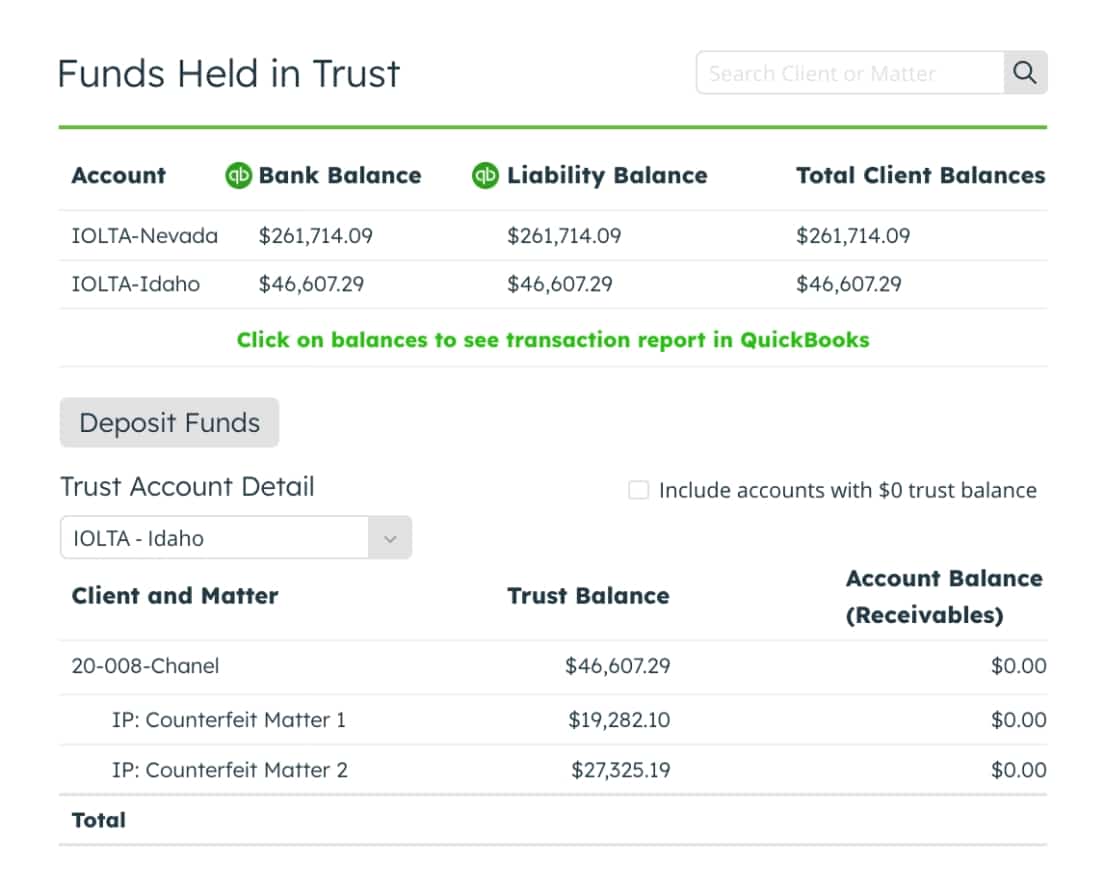
If you are an attorney or practice manager at a small to mid-size law firm, chances are you are pretty familiar with the importance of having high-quality legal billing and accounting software for your practice.
But knowing what “high quality” means is the tricky part.
While there are a ton of various legal practice management software systems on the market today, knowing which one is going to best meet your needs is the key question.

Key Takeaways
- The traditional all-in-one practice management software systems are being challenged in their effectiveness, cost, and overall value to law firms as technology continues to advance and new innovations are constantly being introduced to the market.
- Since all-in-one practice management software is no longer the only (nor the best) way to run a law firm, more companies are competing for your law firm’s business, particularly those that offer billing and accounting support and services.
- Knowing the different features that each of these companies can offer you will be a vital step before you decide which software product is going to work best for your firm.
Two widely used accounting software systems today are Juris Legal and LeanLaw. While both have some popular commonalities, there are also certain factors that make these two billing and accounting software systems extremely different.
You will need to have as many facts about both software companies as possible before you commit your attorneys, clients, and staff (as well as your budget!) to either one.
Let’s do a deep dive into both Juris and LeanLaw and determine which of these two complete accounting systems is going to be the most streamlined financial management solution for your busy business.

First: How is specialized legal billing and accounting software different from all-in-one practice management software?
Before we dissect the similarities and differences between Juris and LeanLaw, let’s understand how these types of software systems are different than an all-in-one practice management software system that claims to be able to do everything, under one name.
Why would a firm want separate billing and accounting software instead of just investing in a traditional practice management software system that can do it all?
Well, there lies part of the answer.
The traditional, all-in-one practice management software systems no longer can “do it all.”
In the past, law firms would invest in these all-in-one types of practice management software systems since their aim was to provide a comprehensive solution for law firms.
Today, law firms no longer need these big, all-in-one practice management software systems because technology has advanced to the point where it’s possible to use other software applications for different functions.
From case management and document management to client communications and data security, there are a number of applications that a law firm is probably already using that can manage these tasks just as efficiently and effectively as an all-in-one software system can…and oftentimes can actually manage it better.

Productivity suites like Office 365 to G Suite are now used by law firms to conduct all sorts of business tasks, from document management to case management and client communication.
With the ability to then integrate the right billing, accounting, and time tracking software into the mix, law firms can now build their own customized technology stack that better suits their specific needs, rather than being locked into a one-size-fits-all system.

Second: The History Behind Juris and LeanLaw
If words like “expense tracking” and “billable hours” and “trust accounting” make your head spin, you’re not alone.
Most attorneys and legal practice managers didn’t go into the field of law in order to be accountants. Though they greatly value the work that these folks do, it’s just not the work they want to do.
This is yet another reason why it’s critical you have a way to truly know the difference between various legal accounting software systems before you invest in one.
Let’s look at a brief background of both Juris and LeanLaw so we can begin to understand how they are similar and different from each other.
Juris Legal: Originally developed by LexisNexis, Juris software was first released in the mid-1990s and was designed with the idea to help law firms manage their accounting and billing processes more efficiently.
Over the years, Juris has undergone several updates and improvements to keep up with the changing needs of law firms.
The software is now widely used by law firms of many different sizes, from solo practitioners to large firms, and is known for its comprehensive range of accounting features, including time and billing management, financial reporting, and trust accounting.
One of the big claims to fame that Juris promotes is the software’s multi-currency support, which may make it a good choice for firms that do a lot of work with international clients.
LeanLaw: LeanLaw was founded in 2016 by attorney Gary Allen, making it a unique product from the beginning.
Allen was frustrated with the existing legal billing software options available in the market. He was determined to create a new cloud-based legal billing software that was specifically designed for small to mid-sized law firms, as he believed that this was an area where big change needed to happen in order for these firms to be as successful as they were capable of.

The product details platforms were clear from the beginning: the software needed to be easy to use, intuitive, and focused on the specific needs of legal professionals. It needed to create a solution that would not only make the billing process more efficient, but that would also help lawyers run their practices more effectively.
Since its inception, LeanLaw has grown rapidly and has become one of the most popular alternatives to the traditional all-in-one practice management software systems.
Unlike Juris, LeanLaw is a cloud-based software system that integrates with QuickBooks Online to keep all financial matters constantly in sync.

Finally: How am I Going to Choose?
Now that you understand a bit more about the reason that accounting software like Juris and LeanLaw are great alternatives to the antiquated all-in-one software management systems and you know some of the backstories behind each of these companies, how do you make the right choice between the two?
Let’s look at some clear specifics that LeanLaw and Juris Legal offer:
LeanLaw:
- offers a cloud-based legal accounting software that is easy to set up and use
- is a time and billing software that is specifically designed for small to medium-sized law firms and solo practitioners
- integrates with various other forms of software such as QuickBooks and Dropbox, allowing for seamless data transfer and management and real-time sync to be happening across multiple devices and platforms
- offers automated features such as trust accounting, expense tracking, and customizable invoices that can be sent out to clients through the software itself
- provides users with valuable analytics and reports to monitor key financial indicators and identify areas for improvement
Juris Legal:
- is a comprehensive legal accounting software solution that may often be more tailored to mid to larger-sized law firms and corporations
- offers an on-premise solution that can be deployed on a firm’s local network or hosted on a third-party server (no cloud-based alternative)
- is more suited for firms that like more sophisticated and complex time tracking, billing, accounts payable and receivable, general ledger, trust accounting, and financial reporting features than smaller firms may want or need
- offers multi-currency support, making it a good choice for firms that work with a large number of international clients.
It’s clear that both LeanLaw and Juris, as well as many other software solutions like Clio or Centerbase practice management, have some features that will be highly beneficial to a law firm. By being able to be integrated into a firm’s already existing tech stack means that a customized legal management system can be created for each specific firm.
Schedule a demo
When it comes to your practice, you’ll need to really analyze the above features and decide which ones are going to be most important to you.
- Are you a small to mid-sized firm that appreciates less complexity and is looking for an accounting system that is easy to use, intuitive, and focused on the specific needs of your legal professionals? (LeanLaw)
- Do you want a system that is cloud-based and allows for real-time sync to be happening across multiple devices and platforms? (LeanLaw)
- Or…are you a larger firm that needs a more complex system that can also offer multi-currency support? (Juris Legal)
Regardless of what software system you choose, make sure that you know exactly what you’re getting and what benefits it will have to your firm.

Want to Try It Out? Visit the LeanLaw Website for More
No matter how much research you do on a new software system, being able to see it working in real-time is going to help you really know what you’re getting as well as what is missing.
Requesting a demo at the LeanLaw website is easy. Simply fill out the secure online form and one of our experts will quickly reach out to you.
Asking that firms trust our word is one thing…seeing the LeanLaw product in action is another.
As more firms make the switch away from the traditional all-in-one practice management software systems, more companies like LeanLaw and Juris Legal will come along to take their place.
Make sure you know what it is you’re looking for and what each system can provide you with.
Reach out to our experts who can help you navigate your path to increased workflow efficiency, increased attorney and staff productivity, and increased financial success with LeanLaw.




